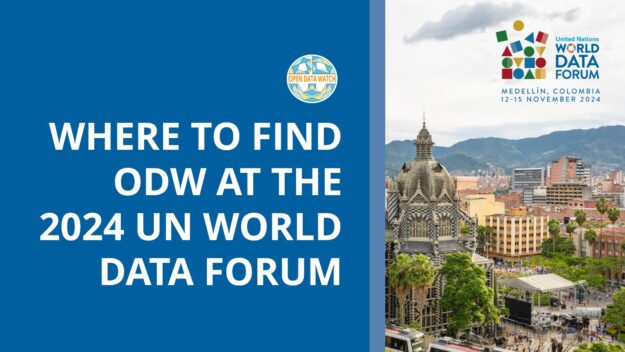Open Data Watch is an international non-profit, non-governmental organization that works at the intersection of open data and official statistics. It monitors the accessibility and comprehensiveness of official data in over 180 countries and provides practical information and assistance in implementing open data policies and systems. The Open Data Watch team has unparalleled experience in development data and is committed to making open data a global reality in support of Sustainable Development Goals.
Ten years ago, Open Data Watch (ODW) started with a clear goal: that sustainable development can and must be empowered with quality operational data. It has been a journey defined by energizing partnerships, adding value, staying adaptable, and continually evolving.
Aiming to spark innovative ideas, collaboration, and partnerships for better sustainable development data, this year’s World Data Forum in Medellín, Colombia, will for the first time be running concurrently with a global “Commit to Data” campaign. ODW is active in both.
Aiming to spark innovative ideas, collaboration, and partnerships for better sustainable development data, this year’s World Data Forum in Medellín, Colombia, will for the first time be running concurrently with a global “Commit to Data” campaign. ODW is active in both.
Some critics see the outcomes of the UN’s recent “Summit of the Future” as out of touch with reality, but we believe the initiatives address key areas of importance that are worth watching.
A special event during the UN General Assembly stresses that gender data and inclusivity must remain at the forefront of global discussion, action, and commitments.
For easy reference in the context of a transfer of work from the IDRC’s Centre of Excellence for CRVS Systems to the UNFPA, ODW has collected here the Center’s series…
Pour faciliter l’accès dans le contexte d’un transfert du Centre d’excellence sur les systèmes ESEC à l’UNFPA, ODW met à disposition une archive des synthèses de connaissances du Centre sur…
Existing guidelines do not explicitly call for open data in SDG reporting, but the language used could facilitate open data practices if VNRs followed the six recommendations of this report.
Open data about climate change and its impacts are vital to planning and implementing effective adaptation and mitigation strategies. This analysis examines pilot assessments conducted in six African countries using the Open Climate Data Template (OCDT). The analysis shares results and suggests takeaways for countries in similar geographic and economic groups.
The Sustainable Development Goal (SDG) agenda makes the ambitious promise to “leave no one behind.” This promise is impossible to keep without country-level gender data.









